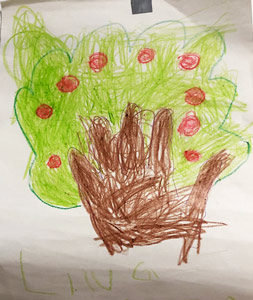About Jin-Yun

Interview conducted in 2020
Jin-Yun is a single mother of Ling, a kindergartner. Ling is on the Autism spectrum.
Jin-Yun's Story: English
Interviewer
Where do you spend the majority of your time and whom do you spend it with? How are you coping with being confined? What are the challenges?
Jin-Yun
When my daughter Ling was diagnosed with Autism at age 3, it felt like my world was spiraling down. Ling's father and I couldn't come to terms with this reality; I was left with neither family support nor financial means. My daughter and I moved in with relatives. They kindly provided us with a room in a very small house with one bathroom to share between three adults and two children. I was not able to work since my daughter required my full-time care. I was all she had, and she was my world.
The following years were difficult but productive. With the help of good friends and therapists, my daughter gradually grew from a little creature of fears into a happy and healthy little girl. She enrolled in a pre-school for Autism and I was able to work part-time. But on the home front, things continue to be challenging. When COVID hit and schools closed, adults lost jobs and were stressed out about finances. We were all stuck at home and Ling and her little cousin were in constant conflicts, to the point that the cousin would lock herself in the one room she shared with her parents to avoid Ling. Being on the spectrum, Ling lacked the abilities to regulate her emotions and understand the consequences of her actions. She felt hurt and angry. The tension between adults grew and we felt no longer welcome. It is simply too much to ask of other people's infinite patience and understanding. Before the lockdown, I used to take Ling out to parks or visiting friends as much as I could, just to give my relatives some family space. Now we could no longer do that.
Interviewer
Describe the challenges you are experiencing due to COVID. How has your child been coping with online learning?
Jin-Yun
However difficult it is to manage my daughter's behaviors; her love of learning has always been my consolation. Ling flourished in the three years of special education, but it all came to a halt when COVID hit. It has been very difficult to keep her focused in the virtual classroom; sometimes I have to physically hold her in her place to get through her lessons. She has regressed a great deal from the social skills that took years to build, which is evident in the way that she interacts with her cousin. It is impossible to keep her contained in a single room. I feel physically and emotionally exhausted from being her only resource around the clock.
My English is very limited, and I often have to rely on others to help me navigate the complicated school and medical systems. I learn as I go, but I am at a loss whenever something doesn't go as planned. This year is Ling's transitional year from Early Intervention to public kindergarten. I dutifully registered her at the local school in February but did not get further notice regarding the required transitional evaluation from the district during school closures due to COVID. Only to find out in September that she was not on the roster. Ling had already transitioned out of the previous service team; we were stuck in a limbo and didn't know where to turn to. Trying to track down the lost registration within the school district was a wild goose chase, and they were not able to provide adequate interpretation or instructions. I would not have been able to sort out this mess without the help of friends. Ling missed 12 days of school, did not get her choices for proper placement, and her evaluation for a new IEP is also delayed. We once again face many unknowns regarding her eligibility for the services that she needs.
There will be more uphill battles to advocate for what she needs and to bring her to the level where she needs to be. But there is also no alternative but to continue forward.
Interviewer
What do you imagine your life will be like after COVID-19? How will the COVID crisis affect disability policy/advocacy? What has surprised you in our present moment?
Jin-Yun
At present, I feel that my daughter's disability benefits are discounted and compromised. There will be more uphill battles to advocate for what she needs and to bring her to the level where she needs to be. But there is also no alternative but to continue forward. My goals are to get more proficient in my English, so I will be able to work more and be independent; move us into our own place; and build a better future for Ling. Through the hard times, I have learned that strength always comes at the right time, and I have grown stronger. And people's goodwill and kindness are boundless.
Jin-Yun's Story: 畅所欲言 (Mandarin)
锦云
请描述你在COVID-19时期内毎天与谁一起渡过?如何面对被局限在这空间里?有那些挑战?
我的女儿玲在3岁时被诊断有自闭症,面对这个事实和许多未知,她的父亲和我的意见不一致。在走投无路之下,我和我的女儿只能搬进了亲戚家的一个小房间,三个大人和两个小孩合用一间浴室。我需要全天照顾我的女儿,所以不能工作。她只有我,我也只有她,我们相依为命。
接下来的几年虽然很辛苦,但是在许多治疗師和好友的帮助下,我的女儿從一个惊慌的孩子成长为一个健康快乐的小女孩。她进入了一个自闭症的学校,我也找到了一些临时的工作。但是疫情和停学改变了整个情况。大人们面对失业和经济上的压力,五𠆤人都关在家里。玲和她的表妹不断地起争执,表妹成天躲在她和爸妈的房间里,不愿易和我女儿玩。因为她的自闭症,玲不懂得如何处理她的情绪和她的行为所引起的后果。在疫情之前,我尽量带我女儿出门去公园或是探访朋友,能给亲戚们一些家庭的空间。但是现在也无处可去。大人之间因此起了许多矛盾,气氛变得很紧张。但是又如何能期待他人无止无尽的包容?
请你描述因为COVID带来的挑战。你的孩子如何应对在网上学习?
虽然玲的行为上的问题让我很头痛,但是使我心慰的是她很好学。三年的特殊教育使她成长了许多,但是这许多的成果在停学時期都中断了。在网络教室里很难让她专注,有时候我必须抱着她才能上完一堂课。多年的心血所建立的社交技能也石沉大海,在她和表妹的关系里也立刻显示出来。她和我成日都困在一间房里,我在精神和体力上都感到筋疲力尽。
我的英语能力非常有限,大部分时候都需要依赖别人的帮助, 尤其是与教育和医疗有关的问题。我尽力一面做一面学,但是如果事情发生问题,经常感到非常无助。今年是玲從早期干预教育转移到公立幼稚园的亟为重要的一年。我在二月时已经为她在住家附近的学校报了名,停学后迟迟没得到学区该作的转移评估的通知。因为疫情,与之前为我女儿服务的人员失去了联系,也无法探讨究竟。到九月才发现学校名单上没有她。和学区交涉的过程中处处碰壁,也没有适当的翻译。终于在朋友的帮助下解决了问题,但是玲不但错过了12天的学校,失去了选择适合她的班级的机会,新年度IEP 的评估也被延迟。她未来的特殊教育服务又面临的一个新的未知。
你预测你的人生在COVID-19之后会有那些不同?COVID 危机將会怎样影响殘疾的政策?
以目前来说,我女儿的殘疾服务是受到亟大的影响。我们將会面对许多的挑战才能为她争取到她所需要的福利,但是我没有其他的选择。我的目标是能学好英语,有一份稳定的工作,搬进我们自己的家,为我的女儿建立一个美好的未来。在这种种的困境中,我体会到了自己的成长,变的更加坚强。
The Chinatown Disability Advocacy Project (CDAP)
The Chinatown Disability Advocacy Project is a grassroots group of parents and community members who educate and advocate for inclusion in education, healthcare, and social life. We hold monthly workshops, education sessions and community activities, so people have information to best plan for themselves and their families. You can follow the Chinatown Disability Advocacy Project on Facebook to find out about our activities.
华阜残障倡导会是一个由家长与社区成员共同组成的团体。我们的使命是运用教学和拥护的方式,提倡在教育,医疗保健,和社交生活的社会融入。我们每个月提供讲座,教育培训,和社区活动,以期提供资源,帮助大家和家人更好的计划未来。请您在臉書上跟随Chinatown Disability Advocacy Project 来参与我们的活动。
About the Project

This project was made possible with generous support from the Independence Public Media Foundation.
For more information
Contact us at [click-for-email].
The Disability and Change Symposium is available as a free online learning module.
Combating Implicit Bias: Employment

About this year's theme
Employment statistics for persons with disabilities continue to be disappointing, ~19% compared to ~66% of peers without disabilities. (US Bureau of Labor Statistics, 2018). We ask ourselves, "is there something beyond overt discrimination and access that perhaps we need to address? Are there silent barriers such as those created by implicit bias?"
Most of us believe that we are fair and equitable, and evaluate others based on objective facts. However, all of us, even the most egalitarian, have implicit biases – triggered automatically, in about a tenth of a second, without our conscious awareness or intention, and cause us to have attitudes about and preferences for people based on characteristics such as age, gender, race, ethnicity, sexual orientation, disability, and religion. These implicit biases often do not reflect or align with our conscious, declared beliefs.(American Bar Association, Commission on Disability Rights, "Implicit Bias Guide," 2019)
This year's theme challenges us to each ask ourselves "What implicit bias(es) do we have and encounter, and how do we recognize them and move beyond them to create opportunities, welcome, and full participation for all?"
As always, this Symposium privileges first-person voices and experiences.
About the Disability and Change Symposium
The stated goal of the annual Symposium is "to create conversation that transcends any one-dimensional depiction of people with disabilities, and foregrounds the multidimensional lives of our speakers - as writers, educators, performers, and advocates."
The Disability and Change Symposium is a one-day, interdisciplinary conference focusing on cultural equity and disability. The event is free, accessible and open to the public.
Acknowledgments
Organized by the Institute on Disabilities at Temple University, the Symposium is an outcome of collaboration with the Interdisciplinary Faculty Council on Disability whose mission is "to foster collaboration across Temple University on disability-related projects including research, teaching, programming, publication, and grant-seeking. By connecting with one another, Council members help build community among the growing number of people at Temple whose work engages with disability."
Core funding for the Disability and Change Symposium is through a grant from the Center for the Humanities at Temple University (CHAT)
We extend our appreciation to Disability Resources and Services for providing Communication Access Realtime Translation (CART) and American Sign Language services for the day.
The Institute on Disabilities, Temple University College of Education is pleased to recognize some of our 2020 Symposium Partners/Sponsors from Temple University:
- Center for Bioethics, Urban Health, and Policy (CBHUP), Lewis Katz School of Medicine
- Center for Humanities at Temple (CHAT), College of Liberal Arts
- Dean of Libraries
- Dean of Students
- Delta Alpha Pi International Honor Society
- Disability Resources and Services (DRS), Student Affairs
- Division of Student Affairs
- Faculty Senate Committee on Disability Concerns
- First Year Writing
- Intellectual Heritage
- Interdisciplinary Faculty Council on Disabilities
- Office of Institutional Diversity, Equity, Advocacy and Leadership (IDEAL)
- School of Sport, Tourism, and Hospitality Management
This year we also want to recognize the contributions of students (Associate Professor Deb Blair, STHM 2114 - Leisure & Tourism in a Diverse Society), who contributed to shaping and supporting this symposium:
- Madeline Culbert, School of Sport, Tourism, and Hospitality Management; Bachelor of Science: Tourism and Hospitality Management (est. 08/2021)
- Jair Guardia, School of Sport, Tourism, and Hospitality Management, Bachelor of Science: Tourism and Hospitality Management. (est. 08/2021)
- Hallie Ingrim, School of Sport, Tourism, and Hospitality Management Bachelor of Science: Tourism and Hospitality Management
- Thomas Leonard, School of Sport, Tourism, and Hospitality Management Bachelor of Science: Tourism and Hospitality Management (est. 08/2021)
- Bryan McCurdy, School of Sport, Tourism and Hospitality Management, Bachelor of Science: Tourism and Hospitality Management (est. 05/2022)
